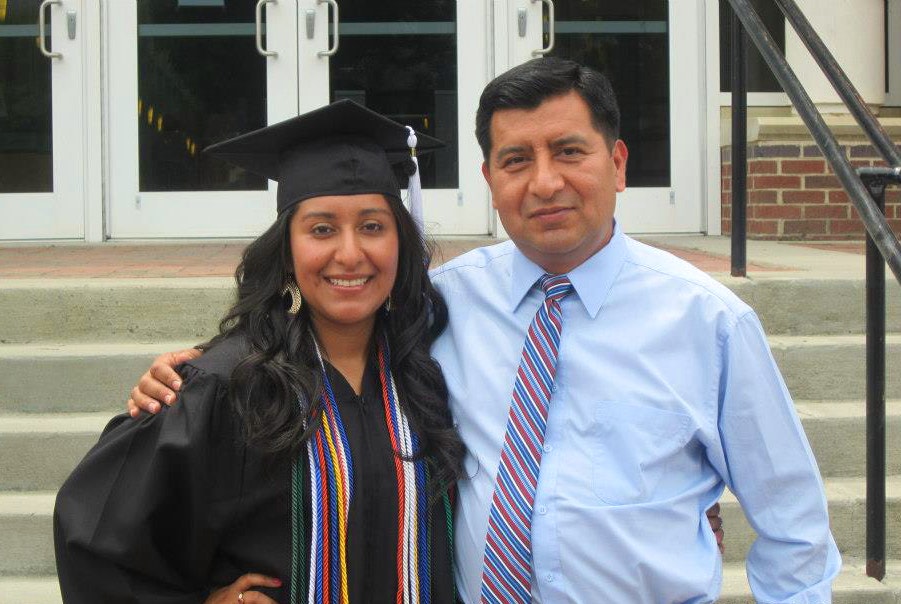Michael LeRoy|
At a recent rally in Maine, Donald Trump delighted followers by saying the U.S. should block access from certain countries, even to refugees who are otherwise legally eligible to come to America.
My Dad, a Hungarian refugee in 1949, faced similar attitudes and policies after the Holocaust.
Jews were removed for their safety into Nazi camps
Mr. Trump’s appalling view of Muslims is nothing new for America. The Roosevelt administration did nothing to provide relief to European Jews until 1944. By this time, it was too late to help my Dad’s family. They were removed from Nyermada, Hungary, and relocated to a “camp” for their “safety” by the Nazis. Real relief for Jews didn’t come until President Harry Truman issued a directive to loosen admissions for Jewish displaced persons. Even then, less than 20,000 Jews qualified.
America has no shortage of brilliant legal talent to stop immigrants coming in
Anti-immigration policies are not merely political. They require legal articulation. In practical terms, that means cadres of lawyers are needed to draft legislation, executive orders, administrative rulings, and court opinions. And recent experience shows that America has no shortage of brilliant legal talent that is poised to make Mr. Trump’s promises of excluding Muslims and deporting millions of illegal aliens a reality.
Whether he is Baptists by birth or choice, it’s true that Baptists have not been subjected to genocide.
Kris Kobach, a Yale J.D., is a prime example. He played a key role in drafting Arizona SB 1070, a law that criminalized the employment of illegal aliens until the Supreme Court, on a 5-3 vote, struck down that provision.
Mr. Kobach had the good fortune, according to his online biography, of being born in Madison, Wisconsin. Whether he is Baptists by birth or choice, it’s true that Baptists have not been subjected to genocide.
Lessons in history help everyone remember their past
But I wonder if Mr. Kobach understands that Baptists started as a persecuted faith in England. Roger Williams began America’s first Baptists colony, the Providence Plantation, in 1636 to give refuge to religious minorities. Try to reconcile Mr. Kobach’s passion for bringing state authority down on illegal immigrants with Roger Williams’ vision of America, and you might conclude that Mr. Kobach would ship Mr. Williams back to England.
My father, by contemporary comparison, was less fortunate than Mr. Kobach. When my Dad died, I was 48 years old. I knew Dad came to America after he lost 26 members of his family in Nazi death camps. But I did not know my Dad was here illegally until after he died.
I didn’t know dad was illegal till after he died
My Dad’s surname name was Lefkovitz— a good hint that he was a Jew. When he met with agents to smuggle him to America after his family’s farm in Hungary was legally seized, his couriers gave him a French last name—LeRoy— to disguise his Jewishness. They gave him $5 as he boarded a cargo ship out of Hamburg. And they gave him false papers to enter America.
My Dad’s fate— hopelessly bleak due to this artificially low quota on Jews— is mirrored today in the fate of Syrian refugees, who, like my Dad, are desperate for a new life.
For the next 56 years, my Dad lived in fear of being found out as an illegal alien—so fearful, he did not even tell my Mom, a Chicago native. She didn’t find out until he was eligible for Social Security benefits. After she pestered him to apply, he told her that the U.S. government knew him to be three years younger than she knew.
He made a fortune; but he was more proud that he donated a fortune to people who had less than him.
After Dad died—and I started to teach a law course on immigration and employment— Mom told me about my father’s dark secret.
Dad worked and hired Americans every day for 56 years
As an “illegal American,” Dad rose from a baker’s assistant in the Catskills, starting work at 3:00 a.m., to owner of a successful construction business and sprawling horse farm outside Chicago. He made a fortune; but he was more proud that he donated a fortune to people who had less than him.
Dad loved to hire outcasts. He knew they would work harder than anyone else.
The current backlash against illegal immigrants evokes memories of my Dad’s long, marble kitchen table. He ran his business from the head of that table. His work crews came by for breakfast and coffee—and detailed work instructions— six out of seven mornings every week.
Dad loved to hire outcasts. He knew they would work harder than anyone else. I can’t count the number of Polish carpenters who worked for Dad. They were Catholic and spoke in heavy accents. It didn’t matter to their boss, a Hungarian Jew. These workers and my Dad epitomized the best of America simply by working together.
In Europe, separated and divided by class, languages, and rigid sectarian boundaries, they would be worlds apart. While my Dad and his workers butchered the English language at my breakfast table, they communicated well enough to build a small construction empire by rehabbing Chicago-area homes with better insulation, doors, and windows.
Dad hired Rick (Polish) and Ray in the late 1970s, the first openly gay men I knew. Today, they might be married—then, they were both rejected by their religious families. When Ray was on his death bed with AIDS-related cancer, Dad traveled 40 miles to beg Ray’s father to visit his own son before he died. Ray’s dying wish was granted because my Dad understood the destructive power of rejection.
James, a U.S. citizen and African-American carpenter from the South Side, was one of my Dad’s favorite employees because, in Dad’s words, James was “a project” who worked out. James wept the day he left my Dad and took a better paying job, with Dad’s blessing. James, an ex-con, was recruited by a Polish worker who told him my Dad gives people second chances.
Then there was Emil, the 82 year-old carpenter from Norway. Rick learned that Emil could not move on and do anything after his wife of 60 years passed away. Emil was an excellent finish carpenter. Rick got him to apply for work. My Dad gave Emil a one week tryout—and on Friday evening, as we prepared for Sabbath dinner, Emil trudged in for his paycheck and asked, “Mr. LeRoy, what about next week?” My Dad hired him.
When Dad bought a 33 acre farm in 1975, it had two shacks that were inhabited year-round by Mexican laborers and their children. I’ll never forget the cold day Dad took me on a tour of these squalid “homes.” They had no toilets, only two stinking outhouses. The “homes” had no heat or air conditioning— just space heaters and box fans.
My Dad was no celebrity; but from the late 1950s until he died in 2005, hundreds of people thanked him for saying, “You’re hired!”
Using the construction side of the business, Dad tore down the shacks and outhouses. His mostly-Polish work crew built a warehouse with attached housing, complete with plumbing and heating.
In return, the Mexican men built fences for pastures and the perimeter of the farm. Dad put me on this crew, too, where I worked under the encouraging direction of an “illegal” boss, Pedro.
I’m in touch on Facebook with Francisco, one of the kids raised on our farm. Francisco has settled in Los Angeles, making a success of himself and guiding his American-born children to a better future. He remains deeply grateful to my Dad. Today, Francisco and his children would be reviled by some of us as an “anchor babies.” For that matter, I am also an “anchor baby.”
“You’re fired!” vs “You’re hired!”
Our nation has a nativist president whose signature expression as a TV celebrity is, “You’re fired!” My Dad was no celebrity; but from the late 1950s until he died in 2005, hundreds of people thanked him for saying, “You’re hired!”
If Mr. Trump will need a small army of lawyers to draft regulations to make good on his promise to deport millions of people who are here illegally, and to exclude Muslims. If you’re inclined to be that lawyer, my father’s 56 years of illegal status in America is meant as an example for you to consider.
Judging from Mr. Kobach’s lawsuits and model legislation, he believes he has made America better for Americans. Tell that to my Dad’s employees, some of whom were born in America and many who weren’t. They would advise you to put your legal talents to better use.
If you join the Trump deportation and exclusion team, you will throw out America’s best hope to be great. You don’t need to open your wallets to these people—simply open your hearts, your minds, and the gates to opportunity.
Professor Michael LeRoy teaches law at the School of Labor & Employment Relations and College of Law, the University of Illionois at Urbana Champaign. His email address is m-leroy@illinois.edu. The views expressed in this article are the author’s own and do not necessarily reflect Global Village Space’s editorial policy.














